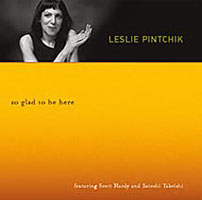Home » Jazz Articles » Album Review » Leslie Pintchik: So Glad to Be Here
Leslie Pintchik: So Glad to Be Here
Pintchik's compositions predominate, and her more balladic are particularly notable. Outstanding is "Hopperesque," which evokes and interprets the work of American painter Edward Hopper, with a '50s-style Afro-Cuban beat and interludes in which Takeishi plies his cymbals. Pintchik seems to favor diminished chords, and the major-minor seventh that closes the work suggests film noir-associated pieces like Washington's "Invitation." Pintchik's "Something Lost" is masterful, a work that sounds through-composed and influenced by impressionistic Bill Evans ballads such as "Time Past." Pintchik's "Mortal" is perhaps the most original and emotive work on the disc, lyrical and pensive, a little foreboding but peaceful. Takeishi starts with spooky cymbals and Japanese-sounding melodic drumming, and the drums continue to wash over and converse with Pintchik's melodic line. Gradually the pace picks up as Hardy's bass turns higher-pitched and more active.
Among Pintchik's up-tempo compositions, the blues-form "Terse Tune" stands out with a minor-mode melody that's catchy but intense, centered on a falling diminished-fifth motive and leaning on minor-sixth chords. With Pintchik's performance in the fore and a great solo by Hardy, the trio play solid straight-ahead jazz. "Happy Dog" is similar, but without the bluesy edge. "Let's Get Lucky" is lilting and a little bluesy with a samba-like groove with quick, well-shaped bass under piano and a compact drum solo. "Luscious" is a medium-up-tempo, loosely- structured tune with a slightly sambaish, dancing groove. Here Pintchik takes the lead, with Hardy playing a soft but active bass and a nice solo.
As the closing track, Pintchik has chosen Monk's "We See," which starts boppish and then grows somewhat cool and laid-back, with Pintchik playing a sparse single line alternating with chords and Takeishi playing with a traditional trap set palette but still melodically. On her debut disc, Pintchik proves her hand with standards and, most interestingly, with her originals.
Track Listing
All the Things You Are; You Keep Coming Back Like a Song; Scamba; Hopperesque; Let's Get Lucky; Happy Dog; Mortal; Terse Tune; Luscious; SOmething Lost; We See
Personnel
Leslie Pintchik
pianoLeslie Pintchik (piano), Scott Hardy (bass), Satoshi Takeishi (percussion)
Album information
Title: So Glad to Be Here | Year Released: 2004 | Record Label: Ambient Records
< Previous
Over and Out
Next >
Common Man
Comments
Tags
Leslie Pintchik
CD/LP/Track Review
Virginia A. Schaefer
Ambient Records
United States
So Glad to Be Here
Concerts
For the Love of Jazz
 All About Jazz has been a pillar of jazz since 1995, championing it as an art form and, more importantly, supporting the musicians who create it. Our enduring commitment has made "AAJ" one of the most culturally important websites of its kind, read by hundreds of thousands of fans, musicians and industry figures every month.
All About Jazz has been a pillar of jazz since 1995, championing it as an art form and, more importantly, supporting the musicians who create it. Our enduring commitment has made "AAJ" one of the most culturally important websites of its kind, read by hundreds of thousands of fans, musicians and industry figures every month.




















